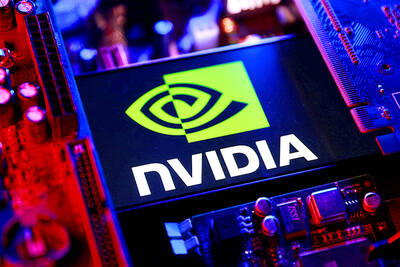ChatGPT, the popular chatbot from OpenAI, is estimated to have reached 100 million monthly active users last month, just two months after launch, making it the fastest-growing consumer application in history, a study by UBS Group AG on Wednesday showed.
The report, citing data from analytics firm Similarweb, said an average of about 13 million unique visitors had used ChatGPT per day last month, more than double the levels of December.
“In 20 years following the Internet space, we cannot recall a faster ramp in a consumer internet app,” UBS analysts wrote in the note.

Photo: AFP
It took TikTok about nine months after its global launch to reach 100 million users and Instagram two-and-a-half years, data from Sensor Tower showed.
ChatGPT can generate articles, essays, jokes and even poetry in response to prompts. OpenAI, a private company backed by Microsoft Corp, made it available to the public for free in late November.
OpenAI yesterday announced a US$20 monthly subscription, initially for users in the US only. It would provide a more stable and faster service, as well as the opportunity to try new features first, the company said.
Analysts believe the viral launch of ChatGPT would give OpenAI a first-mover advantage against other AI companies. The growing usage, while imposing substantial computing cost on OpenAI, has also provided valuable feedback to help train the chatbot’s responses.
The company said the subscription revenue would help cover the computing cost.
Availability of the tool has raised questions about facilitation of academic dishonesty and misinformation.

POWERING UP: PSUs for AI servers made up about 50% of Delta’s total server PSU revenue during the first three quarters of last year, the company said Power supply and electronic components maker Delta Electronics Inc (台達電) reported record-high revenue of NT$161.61 billion (US$5.11 billion) for last quarter and said it remains positive about this quarter. Last quarter’s figure was up 7.6 percent from the previous quarter and 41.51 percent higher than a year earlier, and largely in line with Yuanta Securities Investment Consulting Co’s (元大投顧) forecast of NT$160 billion. Delta’s annual revenue last year rose 31.76 percent year-on-year to NT$554.89 billion, also a record high for the company. Its strong performance reflected continued demand for high-performance power solutions and advanced liquid-cooling products used in artificial intelligence (AI) data centers,

SIZE MATTERS: TSMC started phasing out 8-inch wafer production last year, while Samsung is more aggressively retiring 8-inch capacity, TrendForce said Chipmakers are expected to raise prices of 8-inch wafers by up to 20 percent this year on concern over supply constraints as major contract chipmakers Taiwan Semiconductor Manufacturing Co (TSMC, 台積電) and Samsung Electronics Co gradually retire less advanced wafer capacity, TrendForce Corp (集邦科技) said yesterday. It is the first significant across-the-board price hike since a global semiconductor correction in 2023, the Taipei-based market researcher said in a report. Global 8-inch wafer capacity slid 0.3 percent year-on-year last year, although 8-inch wafer prices still hovered at relatively stable levels throughout the year, TrendForce said. The downward trend is expected to continue this year,

‘BASICALLY A BAN’: Sources said the wording governing H200 imports from officials was severe, but added that the regulations might change if the situation evolves Chinese customs authorities told customs agents this week that Nvidia Corp’s H200 artificial intelligence (AI) chips are not permitted to enter China, three people briefed on the matter said. Chinese government officials also summoned domestic technology companies to meetings on Tuesday, at which they were explicitly instructed not to purchase the chips unless necessary, two of the people and a third source said. “The wording from the officials is so severe that it is basically a ban for now, though this might change in the future should things evolve,” one of the people said. The H200, Nvidia’s second-most powerful AI chip, is one

A proposed billionaires’ tax in California has ignited a political uproar in Silicon Valley, with tech titans threatening to leave the state while California Governor Gavin Newsom of the Democratic Party maneuvers to defeat a levy that he fears would lead to an exodus of wealth. A technology mecca, California has more billionaires than any other US state — a few hundred, by some estimates. About half its personal income tax revenue, a financial backbone in the nearly US$350 billion budget, comes from the top 1 percent of earners. A large healthcare union is attempting to place a proposal before